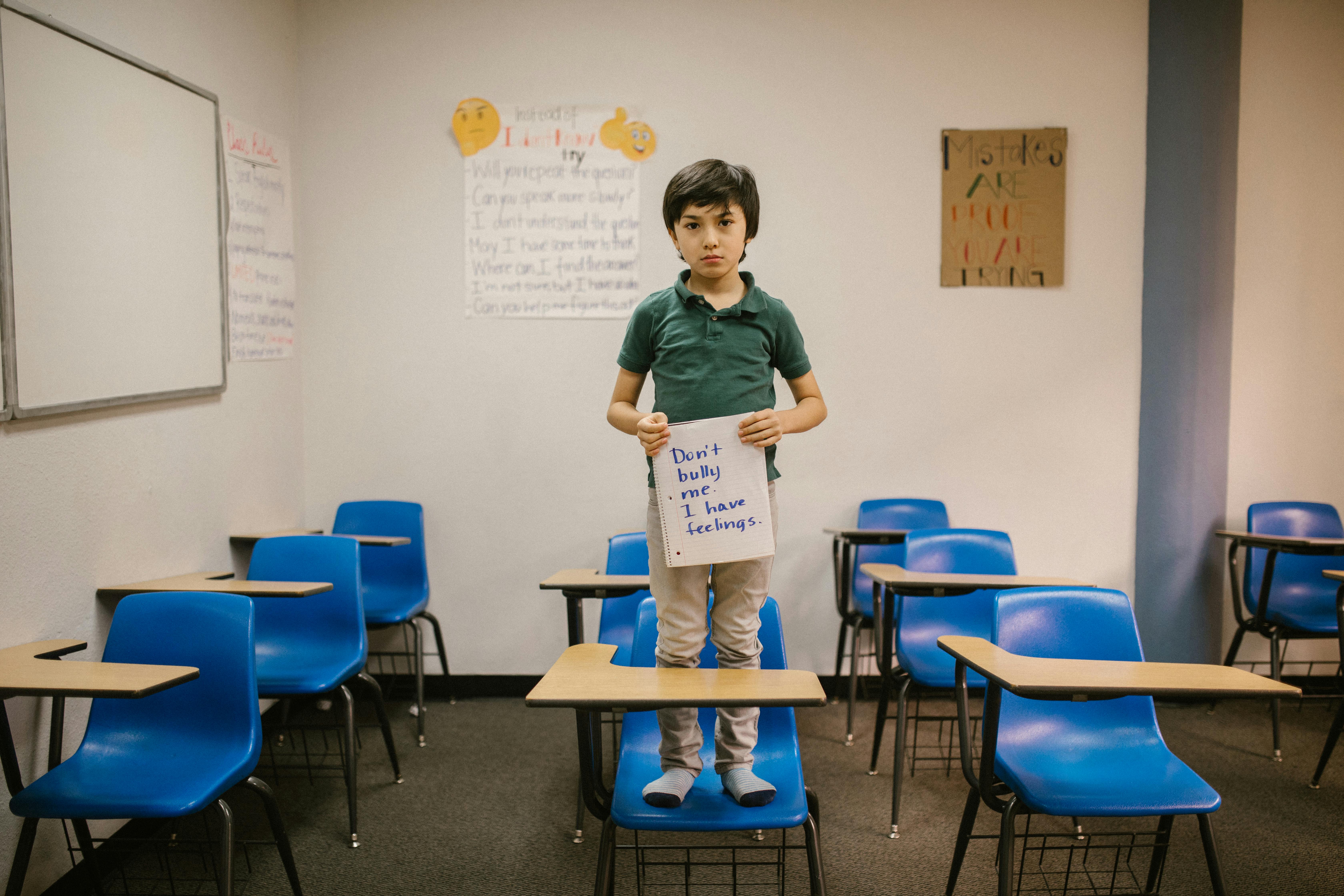
5 Tips for Helping Your Child Deal with Bullying; Bullying is one of the issues that children face during their childhood, especially in school.
According to a report by the National Center for Educational Statistics, one out of every five students reports being bullied. Bullying has a way of messing with the mental health of children.
It disrupts their childhood and leaves them with nothing but pain and regret.
Many adults who were victims of bullying in their childhood still struggle with the trauma even after they are grown.
Bullying can also increase the rate of suicide. According to a study in Britain, at least half of suicides among young people are related to bullying.
A study by Yale University also revealed that bully victims are 2-9 times more likely to consider suicide than non-victims.
So, this is an issue you should not brush off as a parent neither allow your children to handle on their own.
What are some of the most effective ways to help your children deal with bullying? Read more to find out.
What is bullying?
Bullying is a repeated and intentional aggressive behavior where one person (or a group of people) uses words or actions (or both) to intimidate, abuse, or coerce an individual to cause emotional distress and physical harm.
This is usually a case of perceived power or influence over the recipient.
Bullying can be in four forms:
Physical bullying: This is a kind of bullying that results in physical harm and poses a risk to one’s well-being. Children can sustain injuries from this process.
Verbal bullying: Many children are victims of verbal bullying. This is where harsh words are uttered. It can also come in the form of threats. The words can cause emotional distress or a mental breakdown.
This is usually the starting point of every bullying case. Verbal bullying often precedes physical bullying.
Social bullying: This is usually done to tarnish a student’s reputation. It can be done by spreading false rumors about the student.
Because of this, other students tend to avoid the victim. This can cause the student to break down emotionally.
Cyberbullying: In this age where children have access to the internet, they bully other people through it. They do this via text messages, posts, group chats, etc.
They can also spread false rumors via this medium. Cyberbullying is also used to threaten students, especially when they have secrets that could get them in trouble.
If not careful, it can be one of the most dangerous tools for bullying. It instills fear, doubt, and mental breakdown.
Why do kids bully?
There are a variety of reasons why children bully other children.
First, as I mentioned earlier, it could be because of perceived influence and power. So, they try to exercise that power over others.
Second, it could be an issue of insecurities and a lack of love at home. So, they try to fill that need with bullying.
The need to be in power could overshadow their other needs and make them feel significant because they are feared and respected among other students.
But deep down, it’s their way of expressing their need to be loved and seen. However, they do it by inflicting pain on others.
Third, kids bully other kids because it makes them feel important and powerful.
Fourth, kids bully other kids because they enjoy seeing other people cry, beg, and be frightened at the sight of them.
The bottom line reason for bullying is the lack of love and attention, insecurities, and the need to be in power.
On the other hand, kids who get bullied are usually kids who appear less confident, intimidated, and look like pushovers.
They are usually the target victims of bullies. While this is not the only yardstick, it is worth mentioning.
What are the signs of bullying?
Before talking about the tips for helping your child deal with bullying, let’s look at some signs of bullying:
Physical marks: When your child comes home with bruises, scratches, broken bones, stained uniforms, wounds, etc., you should pay attention to them, especially when they don’t have a reasonable explanation.
Fear: If your once enthusiastic child is afraid of going to school or joining school events, that’s a signal that abuse could be happening.
A few friends: Except your child is an introvert, if your child has only a few friends in school, that could be your cue.
Asking for money: Sometimes, bullies don’t stop at inflicting injuries on their peers; they also extort money out of them and make them do their will. One of those things is asking them for money.
Your child might have no choice but to tell lies and always ask for money. He or she might even steal your money to avoid being beaten by the bullies.
Damages: While strangling and dealing with their victims, victims could damage some of their belongings and clothes.
Low academic performance: The reason why your child is struggling in school could be because of bullying. As you already know, bullying affects the mental well-being of any child.
This could affect their academic performance, as it might be difficult to concentrate while facing such issues.
Headaches, stomach aches, or other ailments: The constant slaps and punches in the face could cause headaches for your child. Also, bullies blow their victims in the stomach, which could cause stomach malfunction and pain in the body. If this becomes incessant, you should pay attention to it.
Aggressive or anger outbursts: Most times, victims have a well of anger stored up in them. Since they are usually too afraid to retaliate against the bullies, they look elsewhere to pour out that anger.
And that can be at home. They might be touchy and respond harshly because of their anger. They might even raise their voice while you are talking with them.
5 Tips for Helping Your Child Deal With Bullying
1. An open line of communication:
Children struggle to tell their parents about these issues because they are afraid of not being listened to.
They may rather keep it to themselves than tell an adult. It takes courage for them to open up to you.
So, you should keep an open line of communication between you and your kids. Don’t make them afraid to communicate with you.
One of the ways you can do this is to check in with your kids daily and ask about their welfare.
You can have small talk with them and bond with them daily. Ask them specific questions and inquire about anything that seems wrong. Don’t ignore any signs.
Honestly, this is not as easy as it seems, but it is one of your duties as a parent. You must ensure that your kids grow up in the most conducive environment. They will thank you for this in the future.
2. Listen calmly without judging:
As I said earlier, more often than not, it takes courage for your children to open up to you. So, you should pay attention to them and listen without judging.
Don’t dismiss or belittle their words; instead, you should inquire to discover the root of the matter. Don’t also judge or blame them for being bullied.
Thank them for telling you. Acknowledge their concerns and fears. Make them feel heard and understood.
You shouldn’t make them feel stupid for not fighting back; they will regret telling you, and you might not even hear if something else happens.
I’m sure you don’t want that to cause a strain between you and your child. Listening to your children is one of the best gifts you can give them.
3. Promote positive body language:
Most times, students are bullied because of their vulnerable body language. If a child is not given the freedom to express themselves at home, it often translates to how they talk and behave outside.
Most often, bullies watch people’s body language. Once they spot someone who gives a “victim kind of language,” they will take advantage of that.
So, you must teach your kids confident body language like making eye contact, shaking firmly, raising your head when talking with people, smiling, and so on.
It helps repel a child from being picked by a bully. While this in itself is not enough, it is a major attribute that should not be overlooked.
4. Teach them assertiveness skills:
Teach your child to be assertive. Assertiveness is simply the ability to express opinions, needs, and feelings directly and appropriately. This is usually between being passive and aggressive.
It will help your child to be confident and reduce conflicts. It also helps them set boundaries between themselves and their peers.
For example, if a bully approaches your child for the first time through words but your child keeps mute, it is a signal for the bully to continue his activities. Why? Silence is usually approval or consent.
But what if your child speaks up and says, “Don’t call me those names” or “I don’t like it when you tease me with those words”? There will be a difference because your child spoke up.
It also focuses more on the actions than on attacking the person. But your child won’t know this if they are not taught.
Also, don’t just teach them with your words; you should act as their role model by doing what you say. Children, at times, learn from observations.
Lastly, they should also learn to say “no.” Sometimes, the bullying starts when they don’t know when to decline a request and say “no.”
So, the bullies keep dumping those tasks on them because they know they can’t decline them.
But what if your children start saying “no” to tasks that are not favorable to them? There will surely be a difference in their lives.
5. Reach out to the school:
This is the final stroke. You’ve done what you could at home, so it’s time to bring it to school.
If your child or children inform you that they are being bullied in school, you should reach out to the homeroom or class teacher and school management.
But don’t only do that through calls; it would be great if you could show up physically at the school.
Many schools have bullying policies that punish the bullies and protect the victims from further assaults.
Such actions would also send a message and discourage other bullies from bullying other kids because of the consequences and penalties they would face.
So, it protects not only your child but other kids who are being bullied and will be bullied.
Conclusion (5 Tips for Helping Your Child Deal with Bullying)
Helping your child deal with bullying takes a lot of patience. If there’s something I’ll emphasize again, it is that, as a parent, you are in charge of your child’s formative years.
Your leadership, guidance, and foresight can shield your child from going through a lot of hurt and emotional damage.
Hence, you must be fully present at this stage of your child’s life. Follow the tips and suggestions given in this article to help your child deal with bullies.
You don’t have to follow them chronologically; just apply them as the situation demands.
Did you find value in this post? Share it with your friends on social media.





Add comment